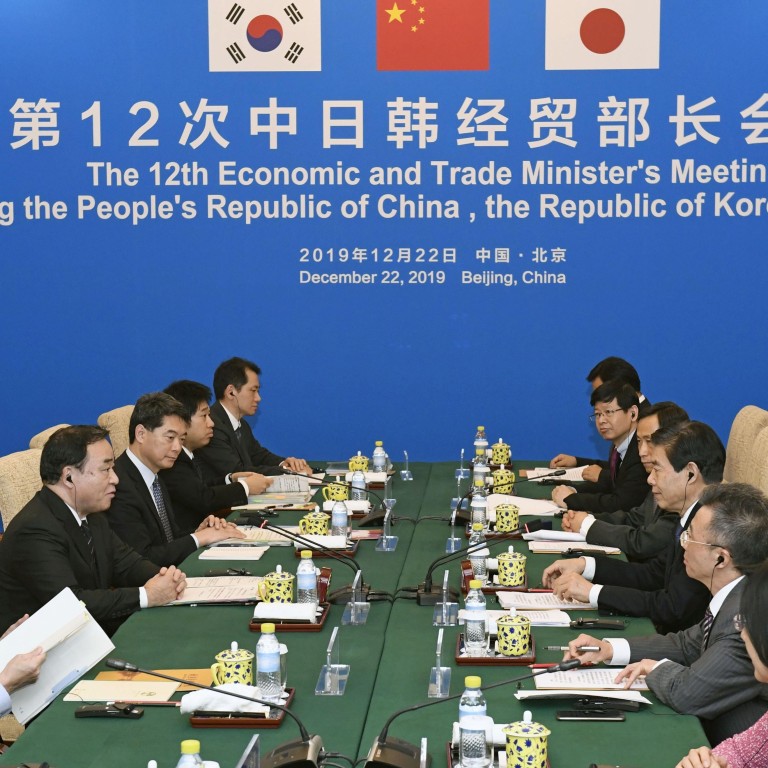
China, Japan, South Korea agree to continue push for free-trade deal despite ongoing tensions across region
- Trade ministers agree to continue to push for three-way agreement as well as a wider Regional Comprehensive Economic Partnership (RCEP)
- Donald Trump says Washington and Beijing will sign an interim trade deal ‘very shortly’ but lingering doubts mean China still wants to strengthen ties
The trade ministers of China, Japan and South Korea agreed to work towards a regional trade pact and a trilateral free-trade deal on Sunday.
The agreement was reached despite the recent bitter quarrel between Tokyo and Seoul and the uncertainty caused by China’s ongoing trade negotiations with the United States, as well as the threat of North Korea resuming nuclear tests.
Chinese Commerce Minister Zhong Shan said China was willing to work with South Korea and Japan to “oppose unilateralism and protectionism” and to support a global multilateral trade system. He added that the three countries should “jointly maintain regional peace and stability and promote an open world economy”.
Beijing and Washington agreed an interim trade deal earlier this month, with Donald Trump saying on Saturday it will be signed “very shortly”.
But the deal remains fragile and a widely shared view in Beijing is that the deal cannot stop the strategic competition between China and US in technology, geopolitics and even values.
South Korea’s industry minister Sung Yun-mo and Japan’s trade minister Hiroshi Kajiyama also said in their opening remarks that three neighbours should work together to deliver the RCEP trade deal, which would cover a third of the global economy and half of the world’s population.
However, divisions remain among the three. For instance, Zhong said China still hoped to agree a regional trade deal next year – a hint that it would accept a swift conclusion that excluded India, which is reluctant to lower its trade barriers.
However, Kajiyama said Japan was adamant that the deal must include the South Asian giant.
There was also no public mention about moves to settle the ongoing dispute between Seoul and Tokyo – triggered by a South Korean court ruling that Japanese firms must compensate wartime forced labourers – that has seen the two countries placing export controls on each others’ goods.
Last Friday Japan partially lifted curbs on exports to South Korea of material used to make microchips in a goodwill gesture, although this alone is unlikely to be enough to resolve the dispute.
Huo Jianguo, the former head of a think-tank under China’s Ministry of Commerce, said earlier that the quarrel between Tokyo and Seoul would cast a shadow over the three-way discussions.
“The conflict between Japan and South Korea is not over yet,” Huo said. “China is willing to help the two to solve their disputes.”
The trade ministers’ meeting formed part of the preparations for a summit in Sichuan on Tuesday, when Premier Li Keqiang will host South Korean President Moon Jae-in and Japanese Prime Minister Shinzo Abe.
President Xi Jinping is also expected to meet Moon and Abe separately in Beijing on Monday.

